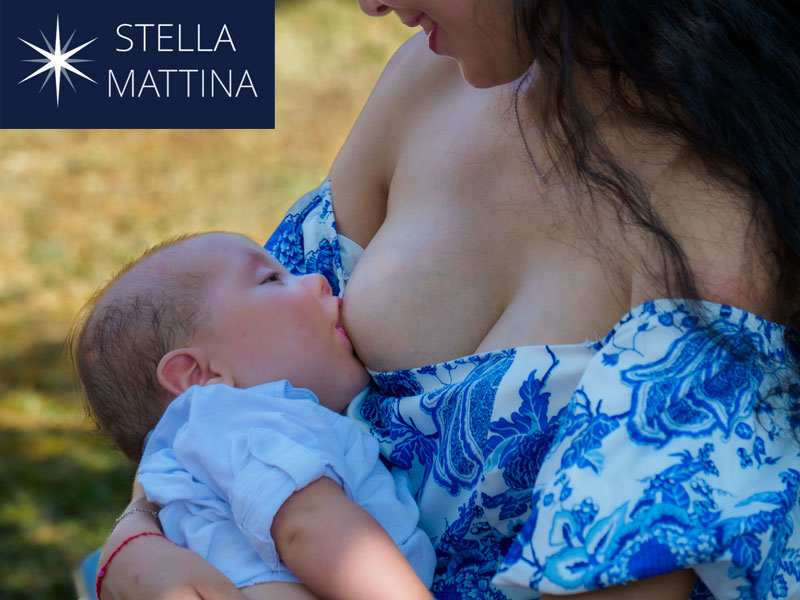
More mothers are choosing to breastfeed, yet rates in the US still lag behind global averages, according to recent statistics. So, it’s worth looking into the full benefit of breastfeeding – both for your baby’s health and your own well-being.
In brief, the breast milk you give your baby meets their nutritional needs, strengthens their immune system, and supports their growth and development in ways that formula cannot fully replicate.
Interestingly, breast milk also changes over time to keep meeting what your baby needs at each stage.
Breastfeeding benefits for you include lowering your risk of breast cancer and ovarian cancer, enjoying emotional bonding through skin-to-skin contact, and recovering more quickly after birth.
So – read on to discover why healthcare providers and pediatricians worldwide agree that breastfeeding gives babies the best possible start!
Table of contents
Immediate Post-Birth Benefit of Breastfeeding
Research on the Benefit of Breastfeeding Your Baby
Top Health Benefits for Breastfeeding Mothers
Benefit of Breastfeeding After One or Two Years Old
Long-Term Benefits for Breastfed Children
Why Pediatricians and Global Health Organizations Recommend Breastfeeding
Emotional, Psychological, and Social Benefits of Breastfeeding
Challenges and Disadvantages of Breastfeeding
 What is the Immediate Post-Birth Benefit of Breastfeeding?
What is the Immediate Post-Birth Benefit of Breastfeeding?
Those first hours and days after birth set the stage for your baby’s lifelong health benefits. Offering your baby breast milk helps them adjust to life outside the womb.
Breast milk is perfectly designed to meet your baby’s nutritional needs right from the start. In the very first feedings, your body produces colostrum – often called “liquid gold” – a thick, golden breast milk rich in antibodies and nutrients.
This first form of breast milk jumpstarts your baby’s vital immunity, protecting them from infections when their own defenses are still developing.
First breastfeeding sessions also create a calm emotional bonding through skin-to-skin contact and the release of oxytocin alongside the breast milk, often called the “love hormone.”
Plus breastfeeding lowers and regulates your baby’s breathing, heart rate, and temperature. All good!
For you, though, an immediate benefit of breastfeeding is to help shrink your uterus to normal again (but more below on your own breastfeeding benefits!)
So, breastfeeding in those first hours helps your baby grow strong and healthy while helping you begin healing and connecting as a mother: a primary health benefit of breastfeeding!
But what does science prove about the benefit of breastfeeding in general?
Research on the Benefit of Breastfeeding Your Baby
Breastfeeding – in other words, your breast milk – protects, nourishes, and reduces some of your baby’s risks in research-proven ways:
Strong Immune System
One proven benefit of breastfeeding is immune protection.
Breast milk is packed with protective antibodies and nutrients tailored for your baby. Remember, your baby has been part of your body for nine months and your body produces breast milk that suits baby’s nutritional needs.
Immune protection helps fight off infections, colds, and even serious illnesses. This means that breastfed babies tend to get sick less often and recover more quickly when they do.
Sudden Infant Death Syndrome (SIDS)
You may have heard that breastfeeding lowers the risk of sudden infant death syndrome (SIDS), and it’s true. Multiple studies back this connection, making it another important reason why healthcare providers encourage exclusive breastfeeding in the early months.
Other Research on Breastfed Babies
There’s also a link between breastfeeding and reduced risk of childhood obesity and type 1 and type 2 diabetes. While every baby is different, breastfed infants seem to have more stable growth patterns and a healthier relationship with food as they get older.
And then there’s brainpower. Studies link components of breast milk to healthy brain development and better cognitive outcomes. Breastfeeding therefore supports your baby’s brain development! And it’s measurable. Researchers have found slightly higher IQ scores in children who were breastfed, especially when breastfeeding continued over several months.
So while you’re holding your baby close and feeding them, the breastfeeding benefits for your baby’s immune system, growth, and development are in action and you can be sure you’re contributing to their future health.
Now let’s look at the benefits for breastfeeding moms we touched on above.
 Top Health Benefits for Breastfeeding Mothers
Top Health Benefits for Breastfeeding Mothers
When people talk about breastfeeding benefits, the focus is usually on the baby! But the benefits of breastfeeding for you are just as remarkable. Every time you feed your baby, you’re also taking care of your own health and recovery.
Physical benefits
Right after birth, breastfeeding helps your body heal by triggering uterine contractions that reduce bleeding and help your uterus shrink back to its pre-pregnancy size. Many breastfeeding moms notice they recover more quickly and feel stronger sooner.
In the longer term, breastfeeding lowers your risk of serious health conditions, including breast cancer and ovarian cancer, type 2 diabetes, and heart disease. These protective effects increase as you continue breastfeeding, even up to two years.
And here’s a bonus you might not have expected. Producing breast milk requires energy, so breastfeeding can help burn any extra calories. This can make it easier to return to your pre-pregnancy weight!
Emotional benefits
Breastfeeding encourages emotional bonding, releases calming hormones, and can even help prevent postpartum depression. Quiet feeding moments can be meaningful and satisfying.
Overall, breastfeeding benefits you and your baby in ways you might not have imagined and we’ve shown the science is there to prove it.
But many moms stop after about six months. Is there any benefit of breastfeeding – and producing breast milk – later than this?
 Benefit of Breastfeeding After One or Two Years Old
Benefit of Breastfeeding After One or Two Years Old
Some people assume breastfeeding is only beneficial in the first few months, but the truth is that there are benefits of breastfeeding after one year.
In fact, breastfeeding after one year – and even up to two years – continues to support your child’s health and development in meaningful ways.
Even in toddlerhood, breast milk continues to provide important fats, proteins, and immunity boosters
As your baby grows into a toddler, breast milk still provides important nutrients, antibodies, and comfort. Even though your child is starting to eat solid foods, breast milk adapts (as we said) to meet your baby’s nutritional needs and helps protect against illness.
Many healthcare providers recommend continuing breastfeeding alongside solid foods for as long as it works for both of you.
Breastfeeding moms often also find that these later months and years bring a deeper emotional bond with their children. Nursing can be a source of comfort through teething, illness, or the big emotions that come with growing up.
If you choose to continue breastfeeding up to two years or beyond, know that you’re still giving your child the health benefits of breastfeeding every day. These moments are just as valuable now as they were in those first newborn weeks.
And these extended breastfeeding benefits can make a big long-term difference to your child’s health and your bond, as we’ll now explain.
 Long-Term Benefits for Breastfed Children
Long-Term Benefits for Breastfed Children
Breastfeeding doesn’t just benefit your baby while they’re infants. Many benefits of breast milk and breastfeeding in general continue well beyond infancy. The early nutrition that breast milk provides lays a strong foundation for years of health.
As we indicated above, research shows that breastfed children often enjoy long-term benefits.
One of the most noticeable effects is on development. Breastfed babies tend to maintain steady growth and development patterns, which can lower the chance of childhood obesity.
Some studies have also linked breastfeeding to better emotional resilience and stronger social skills later in life.
Breast milk supports brain development from day one, and those early gains can still be seen when children reach school age. Many breastfed infants go on to perform slightly better in cognitive and language skills tests, though every child is unique.
The benefit of breastfeeding even extends to reducing your baby’s risk of chronic conditions like type 2 diabetes and heart disease later in life. By supporting your baby’s nutritional needs and immune system early on, you’re helping lay a foundation for good health in adulthood.
As your baby grows, they continue to benefit from the impact of breastfeeding and long-term access to the nutrients in breast milk.
 Why Pediatricians and Global Health Organizations Recommend Health Benefits of Breastfeeding
Why Pediatricians and Global Health Organizations Recommend Health Benefits of Breastfeeding
Healthcare providers, pediatricians, and global health organizations all strongly recommend the health benefit of breastfeeding because of its proven impact on you and your baby.
Their guidance is based on decades of research showing just how much breastfeeding lowers health risks for both moms and babies. For example, breast milk benefits your baby in numerous ways, and breastfeeding lowers your risk of breast and ovarian cancer
In the United States, the American Academy of Pediatrics (AAP) and the Centers for Disease Control and Prevention (CDC) both recommend breast milk as the gold standard for infant feeding.
They emphasize the importance of exclusive breastfeeding for about six months, followed by continued breastfeeding while introducing solid foods (gradually weaning).
This approach helps meet your baby’s nutritional needs via perfectly designed colostrum and breast milk, and provides a strong foundation for immune protection.
At risk of repeating ourselves here, but it’s important… Research supporting these recommendations is clear that exclusive breastfeeding:
- Improves baby’s growth and development
- Lowers your baby’s risk of sudden infant death syndrome
- Protects against infections and long-term health issues
For you, breastfeeding lowers the risk of breast cancer, ovarian cancer, and other serious conditions.
Of course, every family’s situation is different, and healthcare providers can help you figure out what’s right for you.
But supporting breastfeeding wherever possible remains one of the most impactful choices you can make. Which is why it’s also “best advice” from experts around the world.
 Emotional, Psychological & Social Benefits of Breastfeeding
Emotional, Psychological & Social Benefits of Breastfeeding
Breastfeeding benefits are more than physical ones. Breast milk nourishes but it also comforts and reassures your baby through each stage.
Many moms, too, find that breastfeeding brings emotional, psychological, and even social rewards that make the experience deeply meaningful.
That’s because the emotional bonding of breastfeeding – from quiet closeness, skin-to-skin contact, and calming hormones released during feeding – strengthens your connection with your baby and builds trust.
On an psychological level, breastfeeding can also boost your confidence as a mother – often necessary and welcome if you’re a first-time mom. When you’re dead tired, it can give you a serious boost to know you’re meeting your baby’s nutritional needs and supporting their growth and development!
The Benefit of Groups Who Support Breastfeeding
Breastfeeding often connects you with a wider community of mothers and those who support breastfeeding. This social benefit is invaluable.
We advise our breastfeeding moms to reach out to local breastfeeding support groups or even casual meetups to help you feel less isolated. Advice, encouragement, and understanding are readily available.
This is especially valuable during those early months when producing breast milk can feel painful, often messy as your breasts get engorged, and the whole idea of any breastfeeding benefits seems to fly out of the nursery door!
That’s why other breastfeeding mothers and those who support breastfeeding are vital for emotional and social benefits. They’re just as important as health benefits and they can help keep your breastfeeding journey on track…
…despite some potential challenges, which we’ll talk about now!
 Challenges and Disadvantages of Breastfeeding
Challenges and Disadvantages of Breastfeeding
As much as there is a proven health benefit of breastfeeding, it’s also okay to acknowledge that it isn’t always easy. We support breastfeeding moms all the time and understand the potential problems.
Common early difficulties involve latching, nipple pain, engorgement, and low milk supply. These issues are normal and often temporary – and healthcare providers or lactation consultants can help you work through them.
Breastfeeding can also feel time-consuming and physically demanding, especially during growth spurts when breastfed babies seems to nurse around the clock!
Then there are social challenges, like a lack of workplace support, difficulty finding privacy in public, or even unhelpful comments from others.
Key to making the “breastfed babies” experience more positive for you is to find support for breastfeeding mothers in your home, workplace, or community – as appropriate.
But despite a few challenges, breastfeeding benefits can far outweigh any temporary difficulties on your side. Especially if you consider the risk of breast and ovarian cancer.
Find Breastfeeding Benefits and Support for Moms at Stella Mattina
Feeling uncertain during your breastfeeding journey is completely understandable.
Stella Mattina offers breastfeeding support backed by compassionate primary care doctors and a gynecologist Dallas patients trust.
While we advocate for the benefits of breastfeeding, we are equally committed to supporting families who choose formula feeding based on their individual needs.
Make an appointment today and find the care you and your baby deserve.

Dr. Gonzalo Venegas
Gonzalo Venegas, MD is the Medical Director of Stella Mattina Health and a respected obstetrician-gynecologist with over four decades of service in the Dallas medical community. He has led the Department of Obstetrics and Gynecology at Methodist Dallas Medical Center and contributed to community health through his role on the Parkland Health & Hospital System Board. A dedicated mentor at UT Southwestern, Dr. Venegas is known for his leadership, compassion, and commitment to advancing women’s health and medical education.
 What is the Immediate Post-Birth Benefit of Breastfeeding?
What is the Immediate Post-Birth Benefit of Breastfeeding? Top Health Benefits for Breastfeeding Mothers
Top Health Benefits for Breastfeeding Mothers Benefit of Breastfeeding After One or Two Years Old
Benefit of Breastfeeding After One or Two Years Old Long-Term Benefits for Breastfed Children
Long-Term Benefits for Breastfed Children Why Pediatricians and Global Health Organizations Recommend Health Benefits of Breastfeeding
Why Pediatricians and Global Health Organizations Recommend Health Benefits of Breastfeeding Emotional, Psychological & Social Benefits of Breastfeeding
Emotional, Psychological & Social Benefits of Breastfeeding Challenges and Disadvantages of Breastfeeding
Challenges and Disadvantages of Breastfeeding